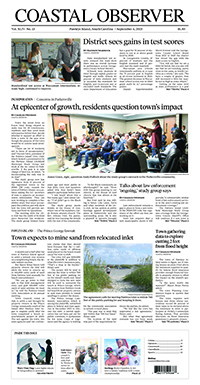Pawleys Island
Town looks at relaxing ban on vending that’s unevenly enforced

Ice cream trucks ran their last route on Pawleys Island 35 years ago when the town made vending illegal. But commerce never went away. From pizza deliveries to bike rentals to beach services, money continues to change hands. The town itself sold $50,000 worth of T-shirts this year for the Fourth of July.
“We’re fooling ourselves,” Town Council Member Guerry Green said. “It’s already happening.”
The council has started talking about ways to allow limited vending on the island, particularly food trucks to accompany a series of events the town now sponsors in the Pawleys Island Nature Park. The discussion is part of a wider debate about how the town can raise revenue.
While no one has suggested that vending itself would raise revenue, officials say that it is part of the overall experience for visitors who provide the bulk of the town’s revenue through taxes on short-term rentals. The town is completing a 10-year update of its state-mandated comprehensive plan. It includes a new element that looks at ways to make the island resilient to natural disasters and sea level rise. It underscores the need for the town to make sure it has economic resilience.
The town’s ordinance is simple: “Vending is hereby declared to be unlawful.” It defines vending as the sale of merchandise or services, but exempts domestic services, utility sale and yard sales up to two a year.
Since the ordinance was adopted in 1988, the way goods and services are sold has changed, Administrator Dan Newquist noted. He recently turned down a business that wanted permission to set up bonfires on the beach, something that requires a town permit, and provide music. He also denied approval from someone who wanted to hold a book signing in the Nature Park gazebo.
Last month, the council heard from Michael Grant, who runs G&G Ice Cream. He is also the building manager at Waccamaw Elementary School, where he has worked for 33 years.
His ice cream truck travels from Georgetown to Murrells Inlet, but Grant said “it just saddens my heart to know that I was born and raised right here in Pawleys Island and I can’t come right where I felt like I grew up at, right on Pawleys Island beach.”
The town adopted the vending ban in 1988 after roadside vendors began to appear on the island. Ice cream trucks were collateral damage, although some people at the time were concerned that kids might run into traffic in search of ice cream.
“The law is the law. Revisit your book. See if you can come up with something that I can come or business can come to Pawleys Island beach and serve the people,” Grant asked the council.
Mayor Brian Henry said he hadn’t actually thought about ice cream trucks when he first raised the vending issue earlier this year. He would like to have food trucks at the Nature Park events and allow sales of local artwork that is displayed at the Old Town Hall.
“Start with something simple like that. We don’t want to put the camel’s nose under the tent,” Henry said. “The trouble I have with an ice cream truck: as much as it sounds cool where do we stop?”
Other towns have franchise agreements that authorize vendors, but limit the scope of their operations, Newquist said.
“It seems like some more research is definitely warranted,” he added.
If the town is going to allow even modified vending, it will have to change its zoning ordinance. That also requires a change to the comprehensive plan, whose land use element contains future land use maps.
The park and the area around the Town Hall, which was once the site of a bar, is zoned for residential use. Newquist proposed creating a “public facilities” zoning district that would be compatible with the current uses and would allow limited vending.
“It doesn’t bind us to anything,” he said. “It kind of sets the framework.”
The Planning Commission is completing its review of the comprehensive plan. Members said they would like to see the town address its revenue needs.
“There’s only one place where we talk about raising money,” commission member John LaMaster said. “There’s not a lot of focus on that.”
The plan states that a business license fee is an option for raising revenue. The town doesn’t have a municipal property tax. Because the state and local accommodations taxes provide the largest share of the revenue in the town’s $1.7 million operating budget, it is vulnerable to a disaster that disrupts tourism, the plan notes.
It sets goals of expanding tourism beyond the summer months and conducting a visitor survey “to better understand public amenity and service expectations of vacation renters.”
Commission member Robert Moser said the emphasis on revenue and tourism is important.
“I don’t think we put enough in either one of them,” he said. “To support the spending that we’re doing, we need to have substantial revenue.”
It’s unclear how much the town of Pawleys Island will need to spend on capital projects over the next decade as it adapts to sea level rise, assesses the condition of the north end jetty that was built in the 1950s and ponders the future of shoals in the salt creek. Newquist said he is trying to come up with reasonable estimates. The one number that he included in the draft of capital projects, $14.5 million, is what the town paid three years ago for a beach renourishment project that it funded with help from the state and a bank loan.
The next renourishment, which the town expects to conduct in partnership with the Army Corps of Engineers, is almost certain to be more expensive.
The town also has ongoing costs for maintaining the rock groins that are now mostly buried by the renourishment sand, the boat landings on the creek, beach accesses, dune plants and sand fence, and its parks.
The town received $250,000 in the state budget this year to implement projects identified in a study last year on adaptation to sea level rise. It expects to receive additional state and federal funding for other capital projects.
About half of the goals and objectives in the comprehensive plan have some monetary component, Newquist said.
“It’s kind of where the rubber meets the road,” he said.
In the meantime, the Town Council will continue to discuss ways to ease the vending restriction, balancing amenities and the character of the island.
“What makes Pawleys unique is it’s not commercial,” Henry said. “But it is because we rent houses, tents, kayaks and bicycles.”
Green suggested the town could limit vending to areas such as Town Hall or the south end parking lot based on input from Newquist and Police Chief Mike Fanning. He was also sympathetic with Grant, who he has known for years.
“Just talking to him puts a smile on my face. I can imagine all these little kids running around here and Michael smiling and treating them well,” Green said. “It’s kind of silly to say no cash can change hands on the beach because it happens all the time.”
Henry agreed noting that the ordinance is out of date and hard to enforce, and adding that he recently bought a lemonade for $1.




